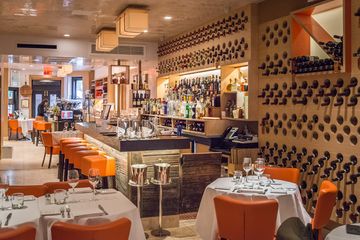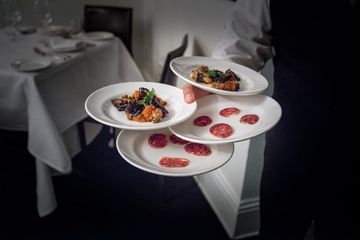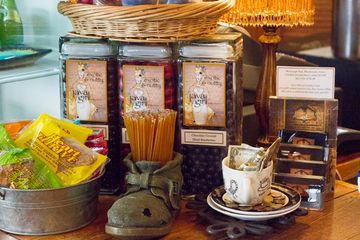Walking down the stairs and passing the espresso bar to enter Altesi, I felt like I had been transported onto an Italian street: the design was so perfectly European, with a calmness and slower tempo that signaled a Mediterranean location far removed from the bustle of Manhattan. The true jewel of Altesi, however, is the owner Paolo Alavian, who, after introducing himself and his very sweet wife, Antonia, treated us like royalty. Paolo's generosity and kindness is extended to each and every individual who enters his restaurant. As he guided us through the orange and cream interior, with wine trellises tucked into geometric patterns on the walls and out into the lovely backyard garden, he warmly greeted his guests before sitting himself down to speak with us. As we savored our veritable feast, beginning with sauteed artichoke, octopus in yogurt and tuna carpaccio, Paolo entertained us with stories. Having opened in 2014, he said that it had been an excellent first year. His other restaurants in Soho - Savore and L'Ulivo - have been around for many years, but, surprisingly, it is on the Upper East Side that Paolo finds the people to be the most supportive and friendly. As he said, "the neighborhood really wants you to succeed. It is the first place I have found where people are protecting the businesses. " Paolo does his part to create a neighborhood hotspot. He let us know that he often hosts breakfast and yoga sessions in his back garden. As our second course of pappardelle with duck, black truffles, and peas along with pasta decorated with chanterelles covered in melted pecorino cheese arrived, Paolo continued to amuse us with stories from his childhood and his arrival in the US. Paolo may be one of the few Italian restaurateurs who did not receive his love of food from his family. He explained that his mother, though a wonderful woman, was a terrible cook, and that until the age of eighteen, he weighed only ninety pounds. His parents, both pharmacists, assumed that he would follow in their footsteps and study pharmacology at the University of Miami, where he received a scholarship. Arriving in Florida, it did not take long, however, for Paolo to realize that his passion laid elsewhere. While continuing his studies, he got his first job in a restaurant as a dishwasher, and then quickly worked his way up to busboy and bartender. He would leave class early to "go to the bathroom" in order to get to his shift on time. He never dropped a class, though - Paolo is a big believer in education. He has always told his employees, "If you want to go to school, I will help you. I will work with you. "Paolo described his love for the restaurant business because it is a true meritocracy, where promotions happen quickly and fairly. His story of moving up the ladder sounds like a fairy tale: as a dishwasher, he was bullied by the kitchen staff, and his hands were cracked and bleeding because his coworkers would keep unplugging the dishwasher so that he would have to do everything by hand. When his employer, his figurative fairy godmother, found out, she moved him to the front room as a busboy. As the third course arrived and the Manhattan Sideways team indulged in a remarkable veal cutlet Milanese, a beautiful piece of salmon with exceptional spring vegetables, and a whole branzino, we continued to be impressed by Paolo's extraordinary generosity to others in need. He spoke of his effort to teach a trade to a person with Down Syndrome, hoping that by working in his restaurant that this person would have a skill that they can use throughout their life. Paolo also told us about the success of the Manhattan Girls Chorus, a group that was begun in 2011 by a patron of the restaurant, Michelle Oesterle. Her passion for music and her desire to provide an outlet for girls who are experiencing bullying, unpleasant situations at home, learning disabilities, or any of the other difficulties in simply being a teenager, drove her to found this organization. It is here that Michelle is able to provide a safe haven for the girls to come each week to practice and confide in one another. Having had the extraordinary opportunity to attend their first gala at the Baryshnikov Arts Center and to hear these young girls share their stories of their personal struggles was incredibly touching, but then they gathered to sing, and my heart could not stop pounding. They were magnificent. Paolo, too, has been affected by these teenagers and has taken one of them under his wing. In her, he recognized a well-behaved, smart girl who needed help, and he hired her to work in his restaurant. He has now, essentially, become her father: mentoring her, pushing her to be the best person she can be, and, Paolo jokingly said, "I even crack down on any clients who ask for her phone number. " Paolo explained that he has always remembered the woman who promoted him to busboy when he was having a hard time, and will always feel the desire to give people similar opportunities.





